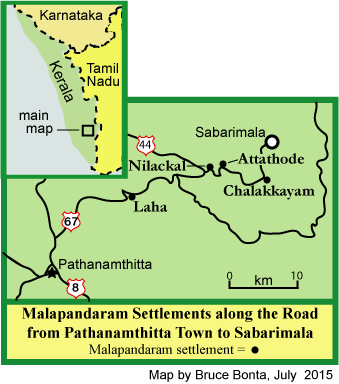The reporter for The Hindu reflected the enthusiasm of the day with his headline, which gushed, “A Day to Rejoice for Tribal Children.” The story at the beginning of June was that a new primary school had opened for tribal children at the Attathode settlement in the Pathanamthitta District of Kerala. Many of the tribal people in Attathode are Malapandaram.
 The local Member of the Legislative Assembly (MLA), Raju Abraham, joined the festivities in opening the new school. Attathode is the second largest tribal settlement in Kerala. Children from some of the other Malapandaram settlements along the road from the district administrative center, Pathanamthitta town, to Sabarimala attended the opening. The huge temple complex of the prominent god Lord Ayyappan is located in Sabarimala.
The local Member of the Legislative Assembly (MLA), Raju Abraham, joined the festivities in opening the new school. Attathode is the second largest tribal settlement in Kerala. Children from some of the other Malapandaram settlements along the road from the district administrative center, Pathanamthitta town, to Sabarimala attended the opening. The huge temple complex of the prominent god Lord Ayyappan is located in Sabarimala.
District Collector S. Harikishore joined the headmaster, Bijumon, and the teachers in welcoming the tribal students into school on its opening day. The report indicated that the school opened for 50 students in classes I to IV, of which 22 were in Class I. More children were expected to come in the days to follow.
Financial support for the school seemed to be secure. Mr. Abraham announced he could pledge Rs. 30 lakh (US $47,262) from the infrastructure development fund for constructing the self-contained school. He indicated that the Member of Parliament, T.N. Seena, would donate another Rs. 10 lakh (US $15,754) from her local area development fund.
The District Collector joined the chorus of support by indicating that the District Lead Bank had pledged to provide the children with school uniforms. He said that the children would receive meals three times per day, and the school would transport them to and from their homes.
The offers of help were overwhelming. The Sabari Saranashram Trust offered to provide food for the children at the new school, and the Carmel Engineering College at Perinad had provided desks and benches. Arrangements had been made for three teachers to be posted to the new school from another tribal school at Kisumom, the MLA said.
An interesting aspect of the June 2nd news report was the statement that many of the children were given “official names” when they were enrolled in the school register, as if their real names didn’t matter. He gave examples: Kunjumol, a school teacher, brought Chandu, who was renamed on the register, Abhishek; Ponni, a girl, was named Meenakshi on the register. The reporter did not explain why they were renamed.
Brian Morris explains, in his book Forest Traders (1982), that renaming Malapandaram children is a common practice. He points out that individuals are not permanently associated with given names. “Anyone may have several names during his lifetime, even concurrently, changing them as his fancies and moods determine (p.152).”
Morris mentions another Malapandaram school, at Achencoil, where children refer to one another with names that are not used by their own families. As an example, he says that Chuppayya refers to his sister as “Karuppayi,” while other relatives of hers call her “Vellachu” or “Kochupennu.” Personal names are not systematized, Morris concludes. It appears as if the new school decided to respect this Malapandaram naming custom.
The same writer for The Hindu, Radhakrishnan Kuttoor, filed a much more discouraging report from Pathanamthitta last week. The new school, hailed so enthusiastically six and a half weeks earlier, was now on the verge of closing. The fault appears to be that of the Tribal Welfare Department, which has failed to provide the support it had promised on opening day.
The reporter indicates that 22 of the 50 students come from the Malapandaram groups living in forest areas of Laha, Nilackal, and Chalakkayam. But the children are not getting the support promised. The school lacks a blackboard as yet. Furthermore, it is supposed to serve food to the children three times each day, but so far officials have not released the funds needed. The District Collector, S. Harikishore, intervened and sanctioned Rs.10,000 (US $158) to help the struggling school from the Kudumbasree Mission fund. But his help may not be enough.
The Hindu names a wide range of agencies that are not helping as they should. The Education and Food and Civil Supplies departments have not made arrangements for serving meals in the middle of the day to the children. Furthermore, the Finance Department has raised objections about allowing the salaries of the staff to be paid. The Tribal Welfare Department has failed to release the funds to operate a jeep that was to transport children from Laha and Chalakkayam, 25 km and 12 km away, respectively.
The headmaster, upset about the lack of support, has gone on leave and the school, according to the newspaper, was probably going to be closed the following Monday—that is, July 20—if the situation were not resolved.